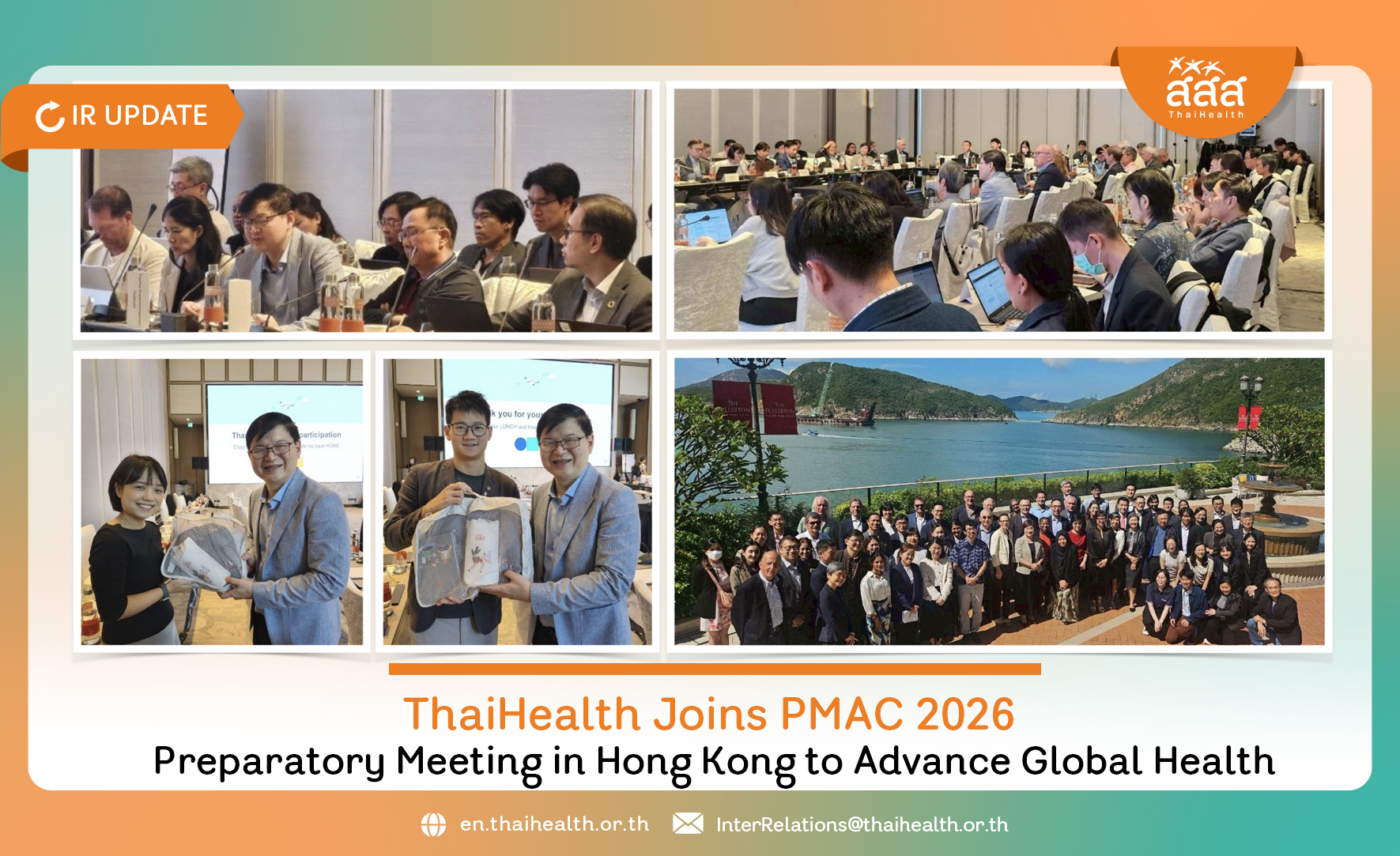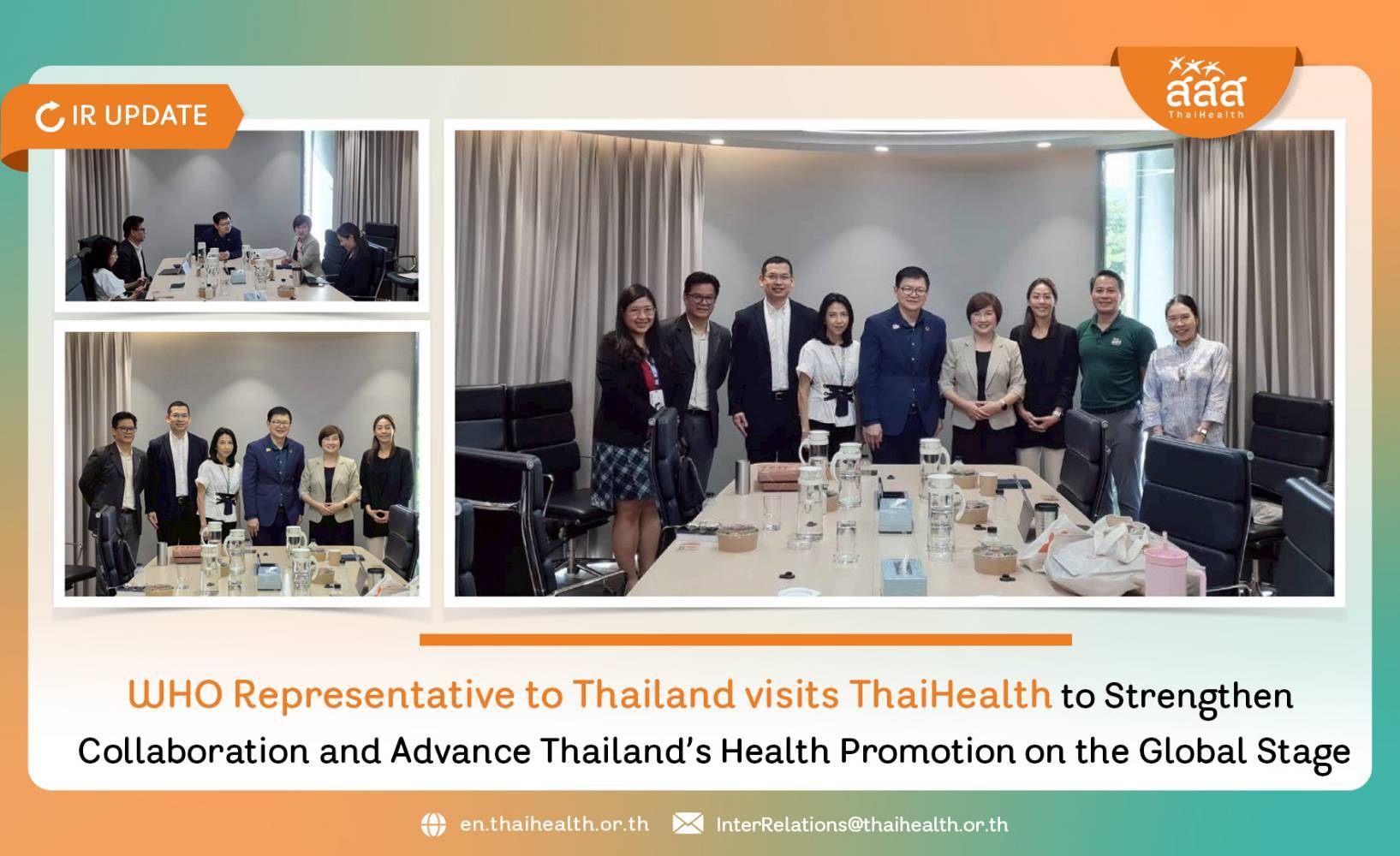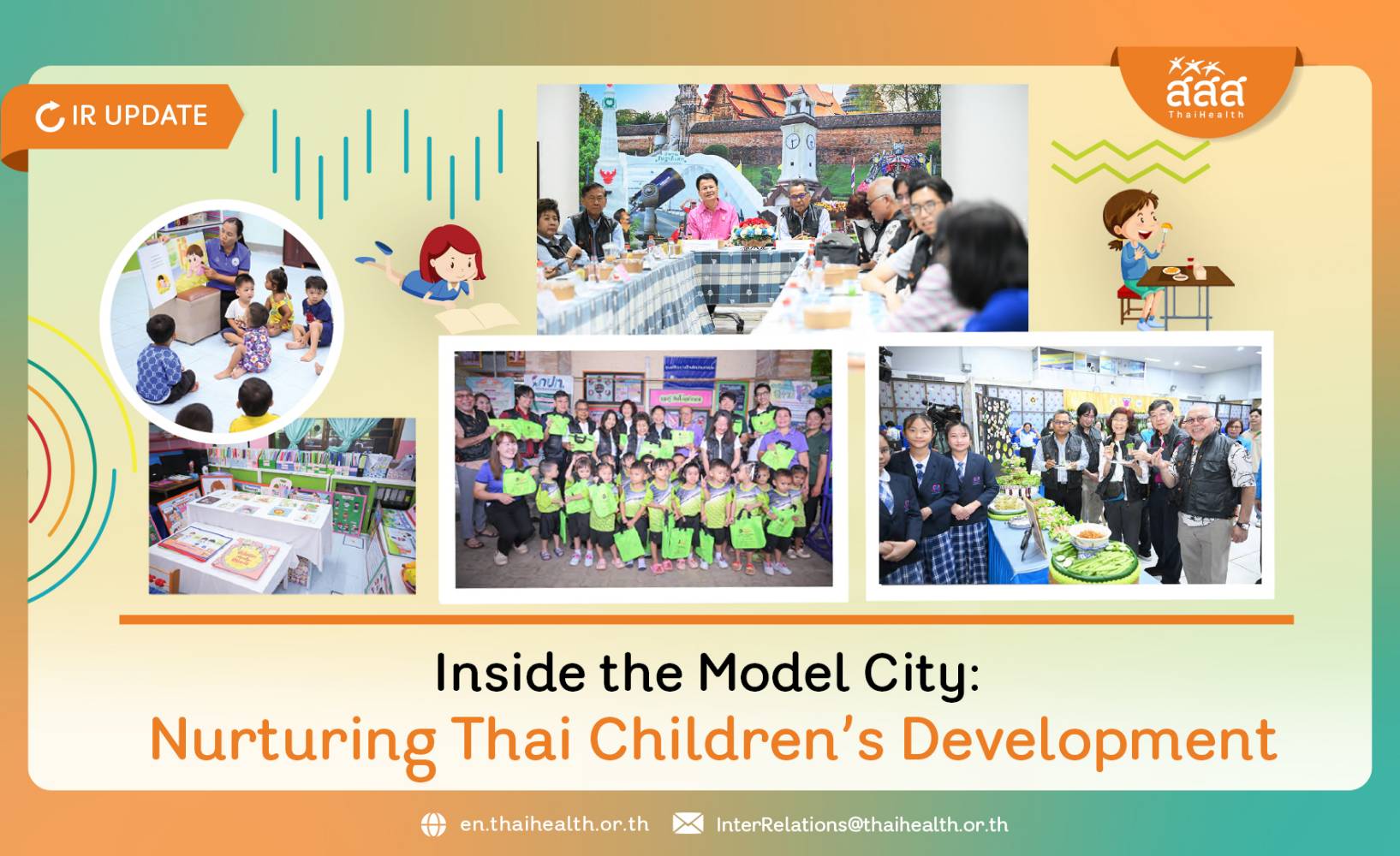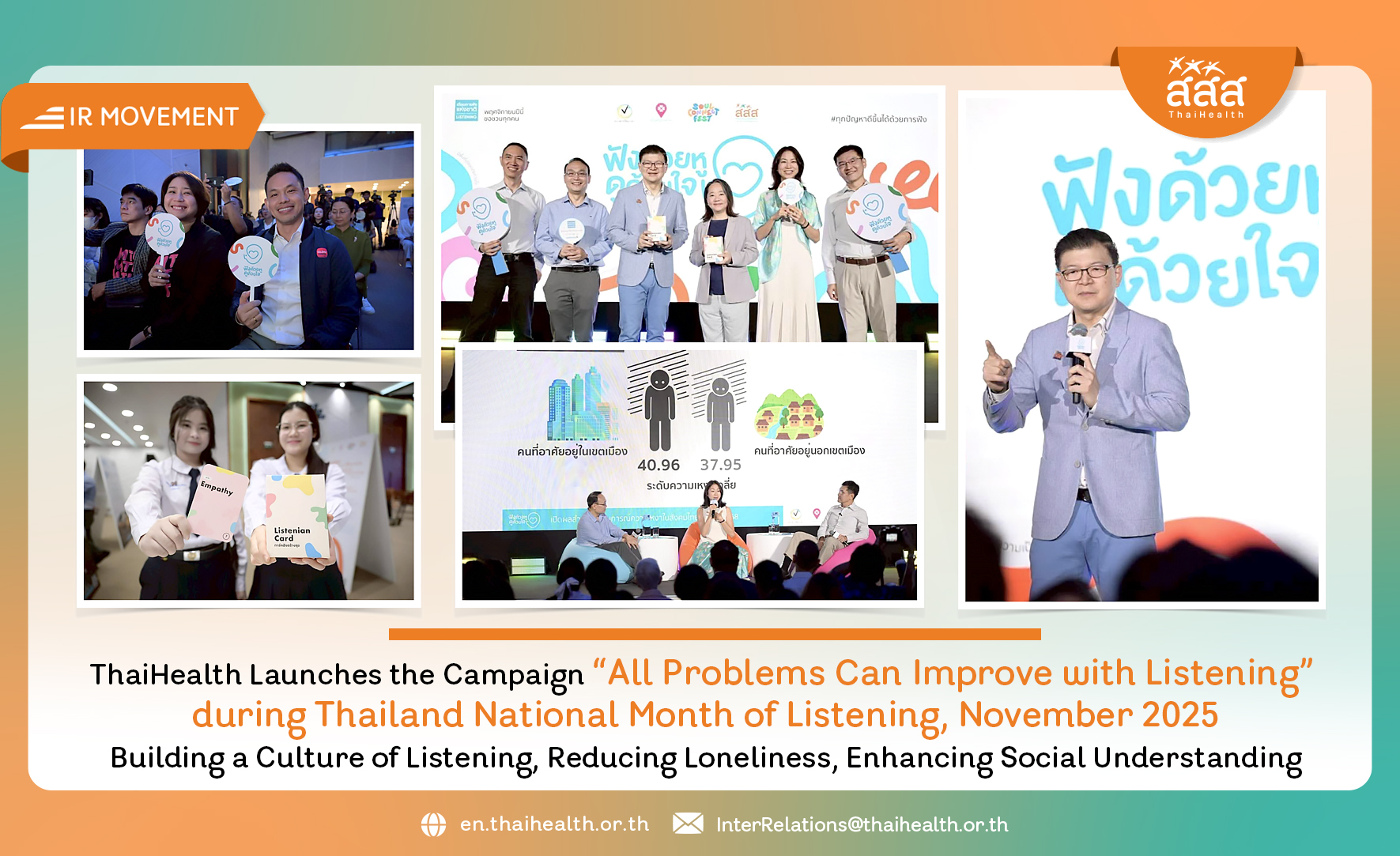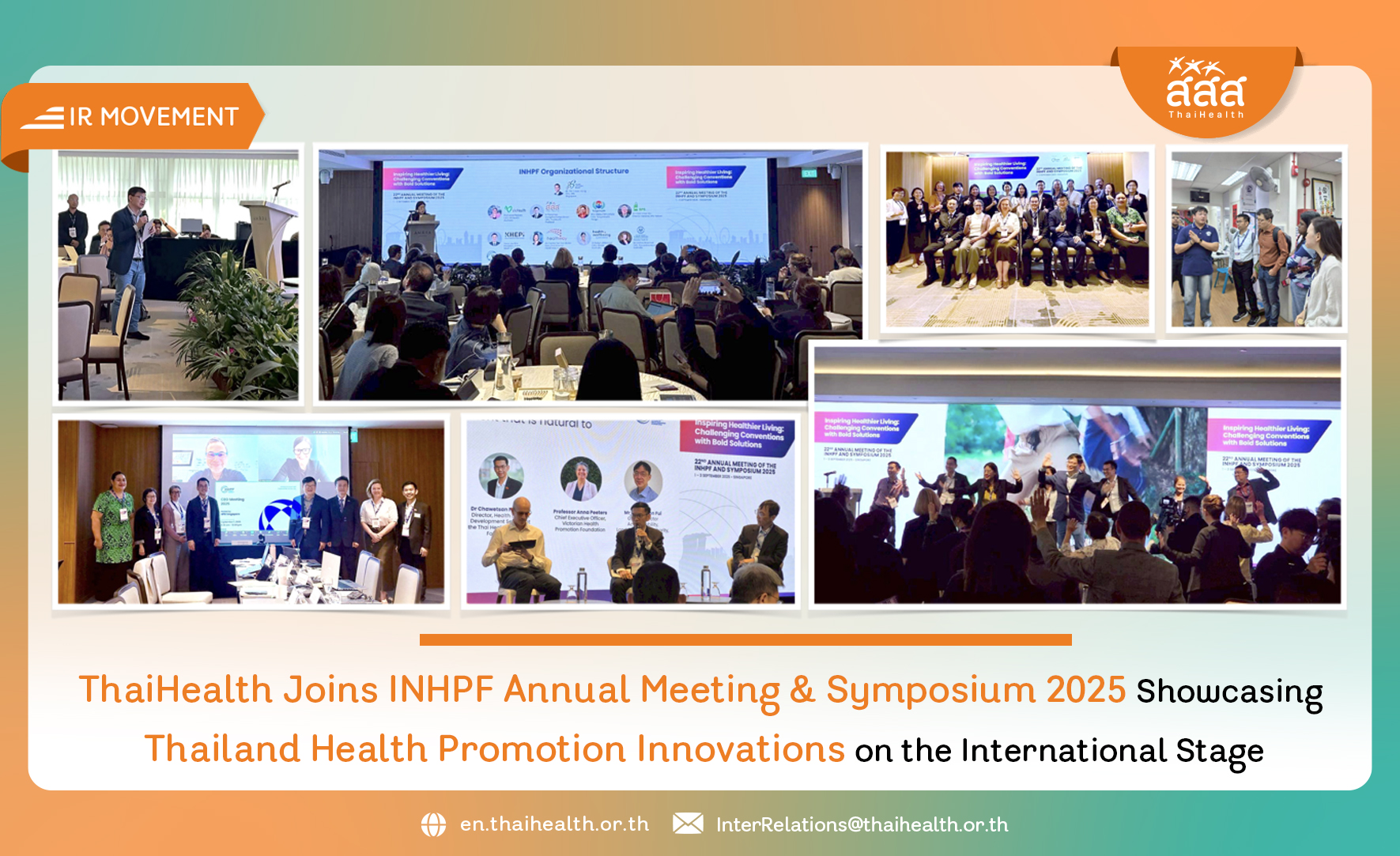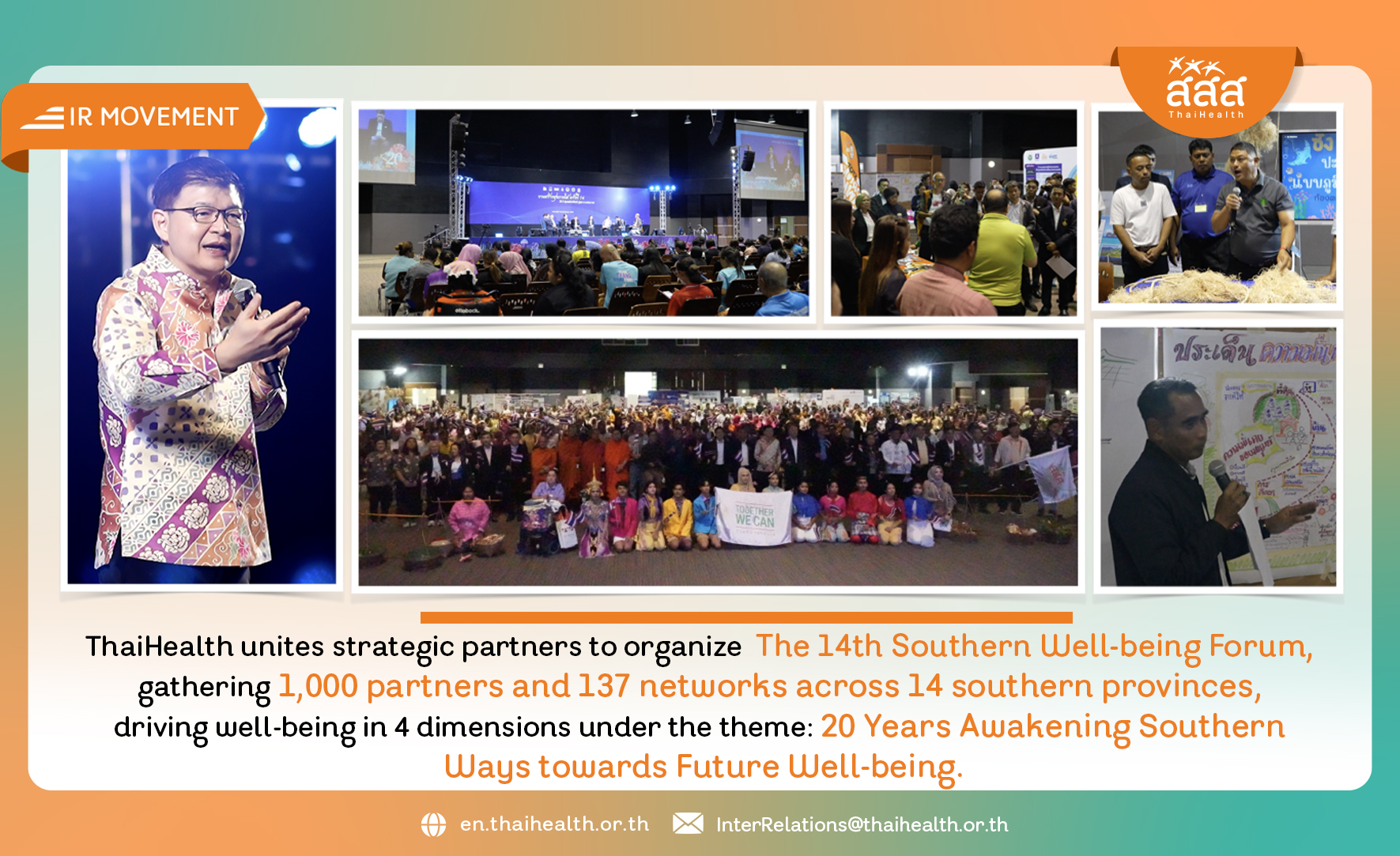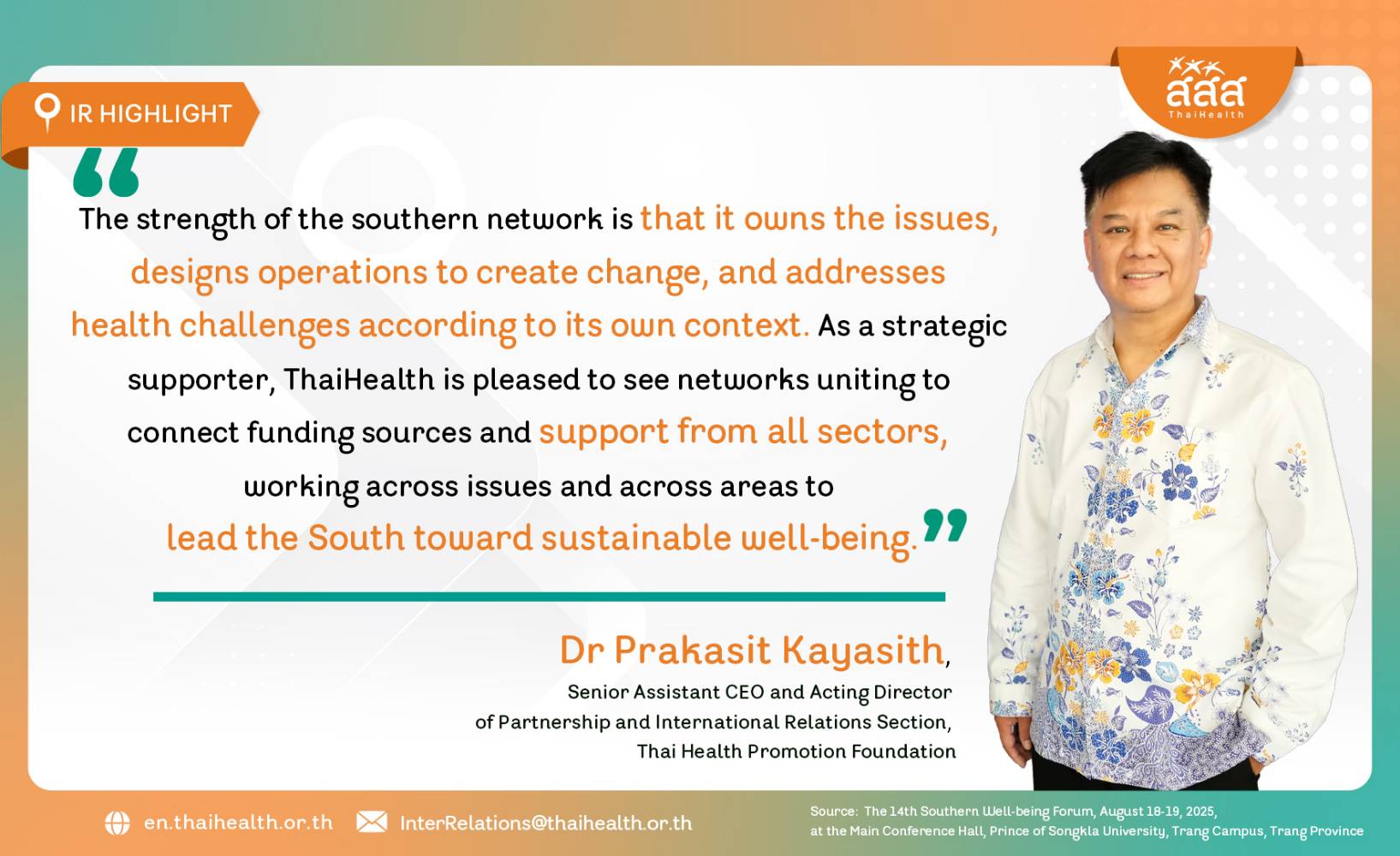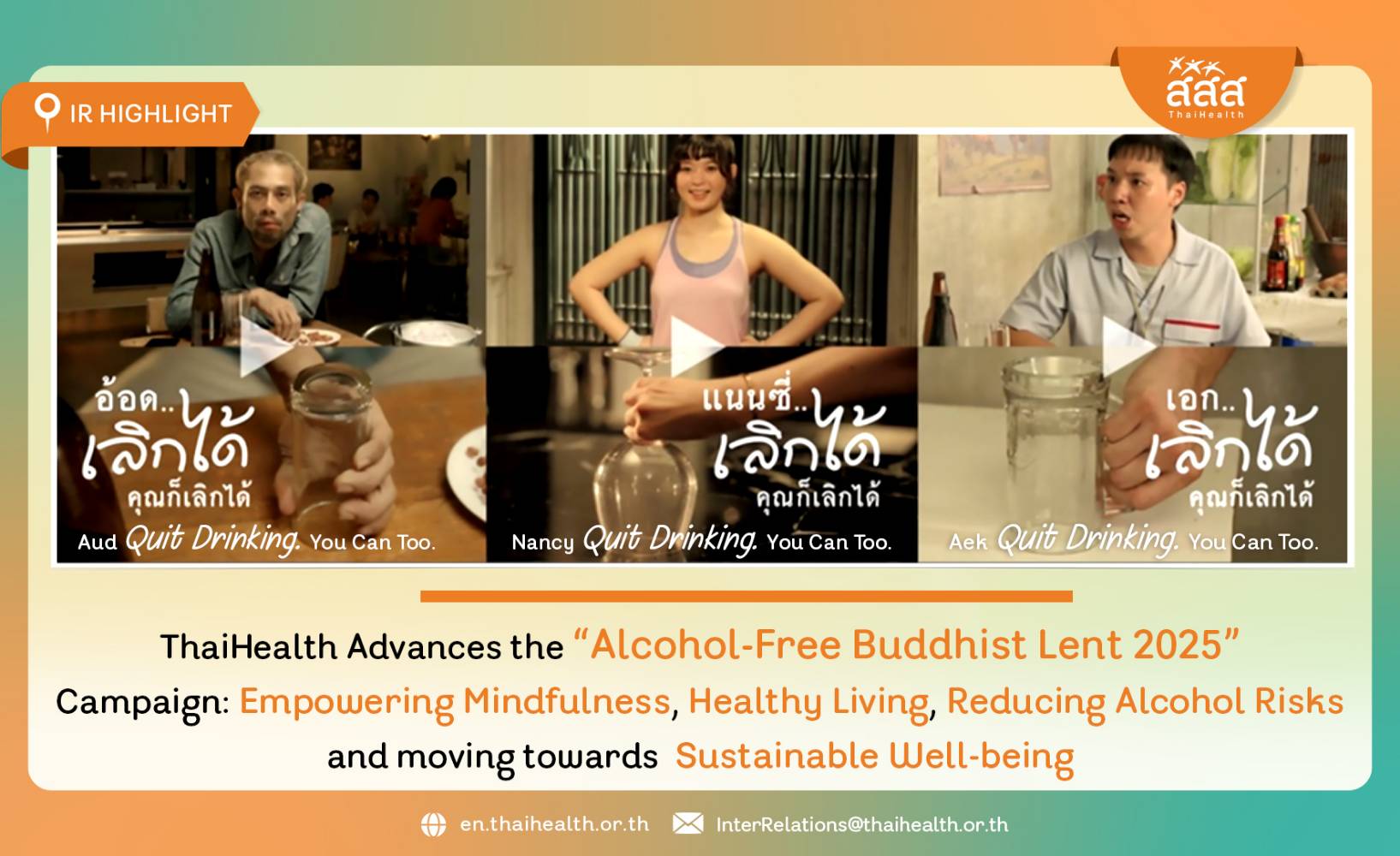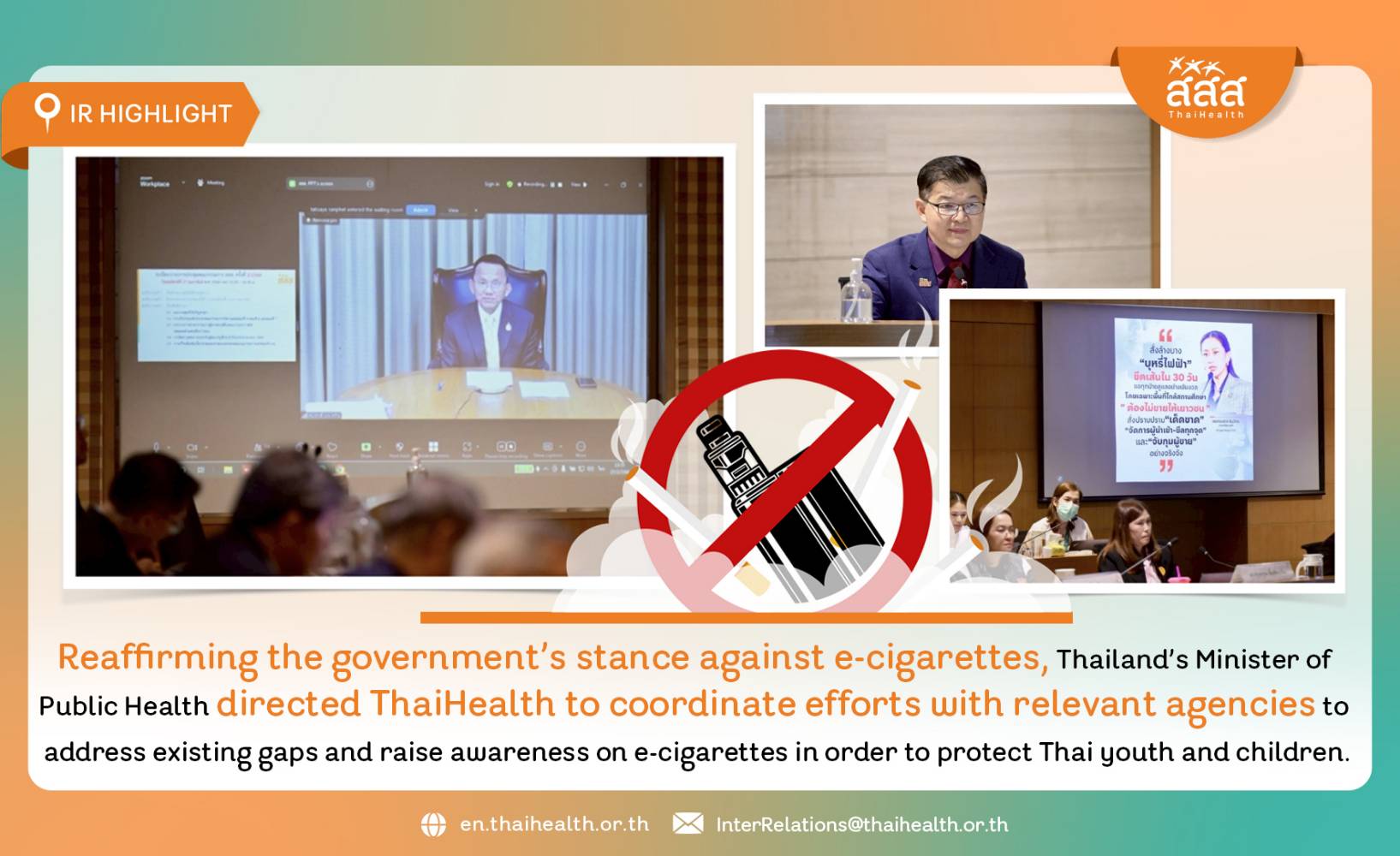IR MOVEMENT

IR MOVEMENT
IR STRATEGIES
Aligned with goals and direction of ThaiHealth
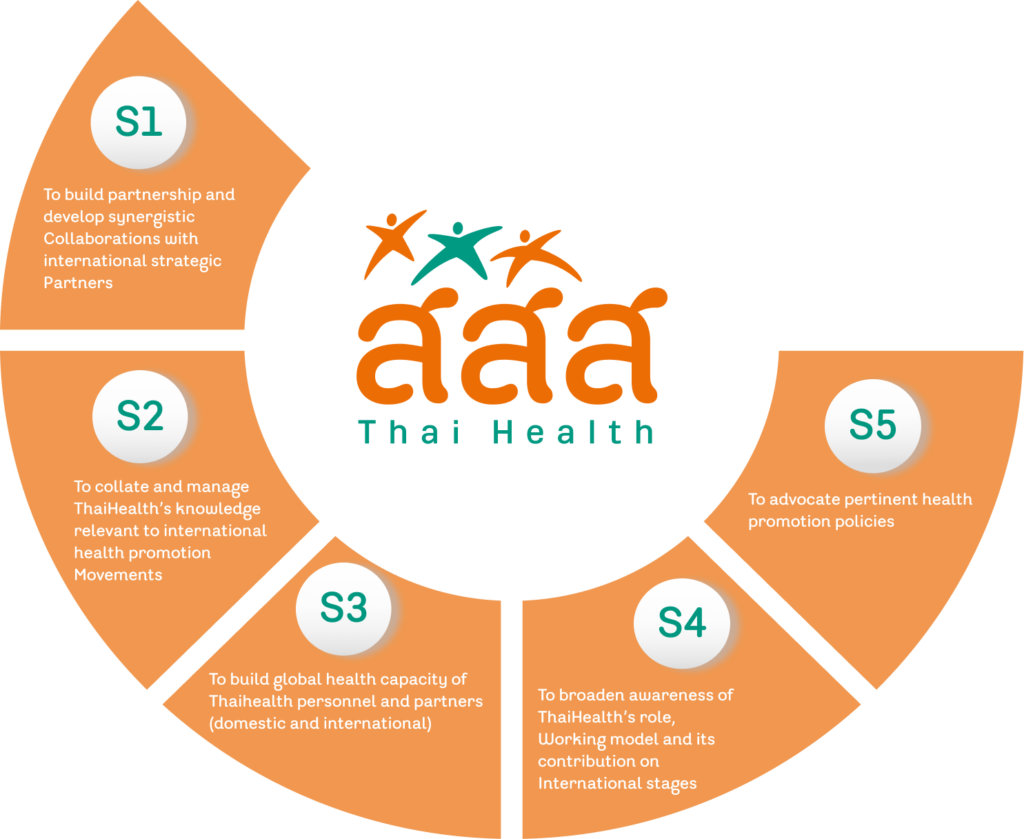

IR UPDATE
ThaiHealth Joins PMAC 2026 Preparatory Meeting in Hong Kong to Advance Global Health Representatives from the Thai Health Promotion Foundation (ThaiHealth) participated in the 4th Prince Mahidol Award Conference 2026 (PMAC 2026), Preparatory Meeting held from 11–13 September 2025 at the Fullerton Ocean Park Hotel, Hong Kong. The ThaiHealth delegation was led by Dr. Pongthep Wongwatcharapaiboon, ThaiHealth CEO; Ms. Natthaya Boonpakdee, Senior Director of Healthy Child, Youth, and Family Promotion; and Mr. Rungsun Munkong, International Relations Expert. More than 70 participants from leading health-related organizations worldwide attended the meeting. The PMAC 2026 will be held in Bangkok, Thailand, from 26–31 January 2026, under the main theme: “Navigating Global Demographic Transitions Through Innovative Policy: An Equity-Centered Approach.” ThaiHealth has served as a Thai co-host organization and a member of both the Thai and International Organizing Committees of PMAC for almost a decade. ThaiHealth’s active role in PMAC helped to elevate Thailand’s health promotion to the global stage through the promotion of healthy and active meeting in PMAC, sharing of best practices and lessons learned, and fostering international collaboration. Key Outcomes of the Preparatory Meeting Abstract Selection for PMAC 2026 Over 250 abstracts were submitted, with around 60 selected for presentation the main conference. Conference Program Development The meeting finalized the key sessions of the conference, including the Special session on geopolitics...
01 Oct 68
62
Views
On 17 September 2025 at the ThaiHealth Center in Bangkok Dr. Pongthep Wongwatcharapaiboon, ThaiHealth CEO, along with Mrs. Benjamaporn Limpisathian, Deputy CEO, Dr. Pairoj Saonuam, Deputy CEO, and Dr. Prakasit Kayasith, Senior Assistant CEO, warmly welcomed Dr. Ailan Li, the newly appointed WHO Representative to Thailand, who assumed her role on 1 September 2025, and Dr. Teeranee Techasrivichien, WHO Technical Officer. The visit marked an important step in strengthening health collaboration between ThaiHealth and WHO, with the aim of scaling up national, regional and global impact. Discussions focused on strategic areas such as E-cigarette control, commercial determinants of health, child development, physical activity promotion, healthy diets, and border health. Embracing a people-centered, community-driven approach ThaiHealth highlighted its major strategic shift towards “a people-centered, community-driven approach”, ensuring that health promotion efforts are more responsive and deliver tangible results at the community level. At the core of this transition is the DOPA Framework, which guides sustainable health promotion through four pillars: Data-driven: Leveraging local-level data to design context-specific health interventions. Outcome-driven: Focusing on measurable, tangible health outcomes. Partner-driven: Building strong partnerships across multiple sectors, especially with civil society organizations (CSOs), to drive sustainability. AI-driven: Harnessing technology and artificial intelligence to enhance health promotion efficiency. This model has already been piloted in several provinces through the District Health Fund mechanism, a collaboration between...
01 Oct 68
76
Views
Well-being by Design Inside the Model City: Nurturing Thai Children’s Development Safeguarding children and youth must begin in early childhood. Today’s children are growing up amid constant change, and numerous health risks. In a world of fast-paced technology, screen time has become a normal part of children’s lives, reducing physical activity and contributing to developmental delays. Diets high in sugar, fat, and salt contribute to early onset of obesity and non-communicable diseases (NCDs), while the prevalence of e-cigarettes poses a daunting challenge. Nurturing Thai children’s well-being is not simple, but it calls for urgent action. Recently, members of ThaiHealth’s 8th Plan Executive Committee took part in a field visit to the “United in Spirit, Building Well-being Together” (Huam Jai Huam Kor Suk) model area in Lampang Province. This showcased how ThaiHealth’s network partners united all sectors to build healthy spaces for children efficiently, delivering notable results in nurturing Thai children’s development and building resilience against various risk factors. Early Childhood: Fostering Spiritual Health Enhancing Communication Skills for Healthy Development The Ban Tha Pong Child Development Center, managed by Soem Sai Subdistrict Municipality, is recognized as a model for promoting reading for children’s well-being. A supportive environment has been established, and both parents and local leaders recognize the benefits of reading. This has empowered them to read to children four times...
20 Aug 68
69
Views

IR MOVEMENT
ThaiHealth Launches the Campaign “All Problems Can Improve with Listening” for the Thailand National Month of Listening — Building a Culture of Listening, Reducing Loneliness, Enhancing Social Understanding The Thai Health Promotion Foundation (ThaiHealth), in collaboration with JitArsaBank and the network of spiritual well-being partners, held a press conference to launch the campaign “All Problems Can Improve with Listening,” on the occasion of the Thailand National Month of Listening this coming November 2025. Now entering its second year, the initiative aims to encourage people in Thailand to learn how to “listen with their ears and see with their hearts,” reduce loneliness, and promote mutual understanding in society. Dr. Pongthep Wongwatcharapaiboon, ThaiHealth CEO, said that ThaiHealth and partners designated every November as the “National Month of Listening.” The campaign first started in 2024, aligning with international efforts that promote a culture of listening—such as World Kindness Day, the International Day for Tolerance, and the U.S. National Day of Listening. The goal is to spark awareness in society about the importance of listening and to build a culture of listening together. In the Thai context, society is facing issues of relationship gaps, intergenerational divides, and conflicts of differing opinions, along with significant loneliness and isolation. Research shows that one day of loneliness or isolation can affect physical health the same way as...
24 Oct 68
44
Views
From September 1–3, 2025, at the Amara Hotel, Singapore, the Thai Health Promotion Foundation (ThaiHealth), in its role as Secretariat and member of the International Network of Health Promotion Foundations (INHPF), participated in the “INHPF Annual Meeting & Symposium 2025,” organized by the Health Promotion Board (HPB) Singapore under the theme “Inspiring Healthier Living: Challenging Conventions with Bold Solutions.” In addition to the 9 full members of the INHPF, The meeting convened health promotion leaders from the Asia-Pacific, Africa, and global partners, including the World Health Organization – Western Pacific Regional Office (WHO-WPRO), Southeast Asia Tobacco Control Alliance (SEATCA), PROGGA from Bangladesh, Health Promotion Centre Brunei Darussalam, Ministry of Health Vanuatu, Ministry of Health Kenya, International Institute for Legislative Affairs (Kenya), and McCabe Centre for Law and Cancer (Australia). The INHPF Network also officially welcomed new associate members: the Ministry of Health Malaysia, PROGGA (Bangladesh), Health Promotion Centre Brunei, McCabe Centre for Law and Cancer (Australia), and the Sarawak State Health Department (Malaysia). This expansion reflects INHPF’s growing role as a key platform connecting international practices and policies in health promotion. Platform for Knowledge Exchange and Cooperation The INHPF Annual Meeting & Symposium 2025 served as a platform bringing together global health promotion leaders to exchange knowledge, foster cooperation, and set future directions, while strengthening ties among member organiztions. Key...
04 Sep 68
47
Views
ThaiHealth unites strategic partners to organize “The 14th Southern Well-being Forum,’ gathering 4,000 partners and 137 networks across 14 southern provinces, driving well-being in 4 dimensions under the theme: ’20 Years Awakening Southern Ways towards Future Well-being. On August 18-19, 2025, at the Main Conference Hall, Prince of Songkla University, Trang Campus, Trang Province, the Thai Health Promotion Foundation (ThaiHealth) joined forces with the National Health Commission Office (NHCO), the National Health Security Office (NHSO), the Ministry of Public Health (MOPH), the Community Organizations Development Institute (CODI), the Trang Provincial Administrative Organization, Trang Health Assembly, and Prince of Songkla University to organize “The 14th Southern Well-being Forum.’ This forum was held to reflect on two decades of building well-being networks in the South of Thailand and to define new directions for its sustainability. Dr. Pongthep Wongwatcharapaiboon, CEO of ThaiHealth, delivered the opening address, stating that the event was not only an exchange platform but also a ‘central mechanism’ enabling networks to join forces across areas and issues to find solutions to the South’s complex problems. Looking back to 2006, the forum began as the ‘Show, Share, Connect’ forum to open space for community partners, civil society, and local agencies to share experiences and connect. It later advanced with the Health Assembly tool, allowing social power, knowledge, and policy to converge,...
29 Aug 68
43
Views

IR Highlight
“The strength of the southern network is that it owns the issues, designs operations to create change, and addresses health challenges according to its own context. As a strategic supporter, ThaiHealth is pleased to see networks uniting to connect funding sources and support from all sectors, working across issues and across areas to lead the South toward sustainable well-being.” Prakasit Kayasith, Senior Assistant CEO and Acting Director of the Partnership and International Relations Section, ThaiHealth Source: The 14th Southern Well-being Forum, August 18-19, 2025, at the Main Conference Hall, Prince of Songkla University, Trang Campus, Trang Province
02 Sep 68
40
Views
ThaiHealth Advances the “Alcohol-Free Buddhist Lent 2025” Campaign: Empowering Mindfulness, Healthy Living, Reducing Alcohol Risks and moving towards Sustainable Well-being The annual Buddhist Lent has marked a meaningful period where many Thais take the opportunity to “abstain from alcohol” to revitalize their physical and mental health as well as strengthen family relationships. In 2025, the Thai Health Promotion Foundation (ThaiHealth) has launched the “Season of Mindfulness: Alcohol-Free Buddhist Lent 2025” campaign guided by the concept “Mindful and Joyful on Every Occasion.” The initiative draws on cultural values and social campaign strategies to bring about a sustained decline in alcohol consumption among Thais. Campaign: “Mindful and Joyful on Every Occasion” Dr. Pongthep Wongwatcharapaiboon, M.D., CEO of ThaiHealth, explained that this year’s Alcohol-Free Buddhist Lent is designed not only to promote short-term alcohol abstinence among people but also to achieve “long-term change” in their drinking behaviors. Therefore, ThaiHealth has broadened its campaign to promote continuous alcohol abstinence during all festivals, inviting people of all religions to join for their own health, their families, and their loved ones. Notably, this campaign is comparable to the international campaigns such as “Dry January” in the United Kingdom or “Dry July” in Australia. However, the uniqueness of the Thai campaign lies in its use of the Buddhist Lent period, which lasts three months and is deeply...
14 Aug 68
74
Views
Somsak Directs ThaiHealth to Raise Awareness on E-Cigarettes to Protect Children and Youth Reaffirming the government’s stance against e-cigarettes, Somsak has assigned ThaiHealth to coordinate efforts with relevant agencies to address existing gaps. He expresses concerns over the deadly risks of “pod k” and approves the Centre for Alcohol Studies’ plan to advance knowledge, reshape societal values, and promote alcohol-free events. On February 27, 2025, at the ThaiHealth Center, the Thai Health Promotion Foundation (ThaiHealth), Mr. Somsak Thepsutin, Minister of Public Health and First Deputy Chairman of ThaiHealth, stated at the second board meeting of the year that the board approved the Centre for Alcohol Studies’ plan, focusing on enhancing capacity among personnel and expert networks and developing knowledge to advance various policies. Key policies include developing and enforcing the laws controlling the alcohol production and distribution by small-scale manufacturers, assessing the policy impact of major alcohol producers, promoting responsible behavior among youth and women, implementing alcohol-free policies for government events, improving access to alcohol cessation services, and supporting research and knowledge creation to push for practical and effective solutions to alcohol-related issues. “Prime Minister Paetongtarn Shinawatra’s government prioritizes the issue of e-cigarettes, which have been prevalent among children and youth. The Prime Minister has ordered relevant agencies to implement stringent measures within 30 days. The directive enforces a ban...
04 Apr 68
819
Views


